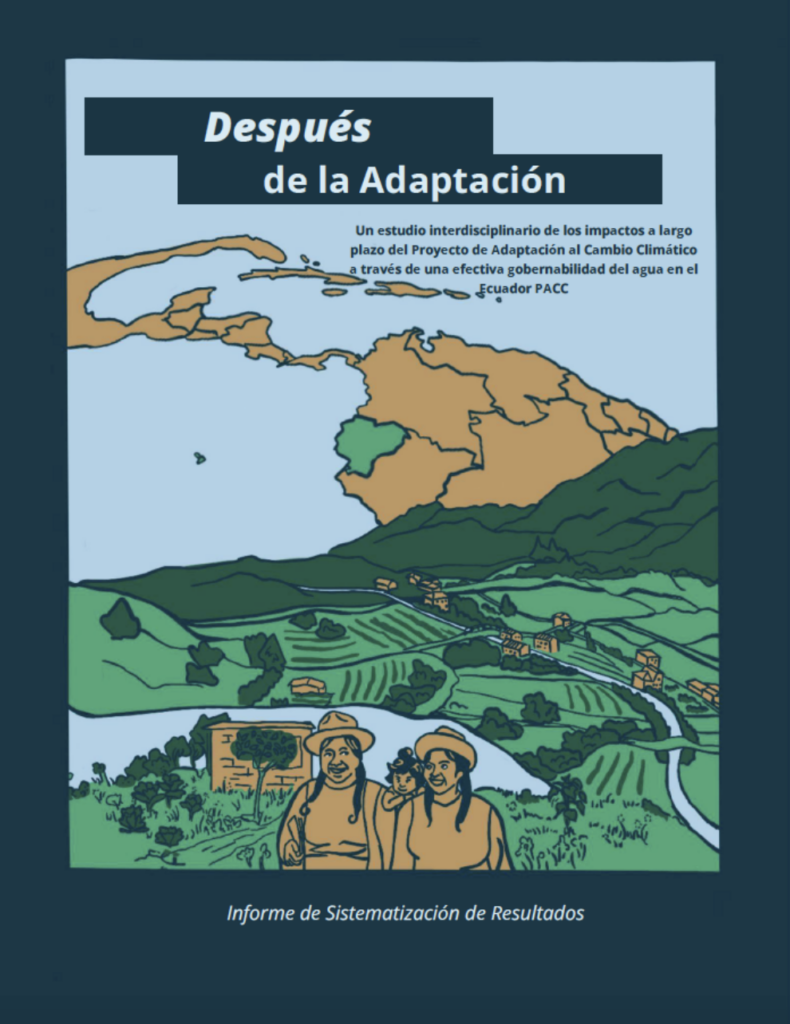What happens after an adaptation project ends?
Over the last decade, hundreds of climate change adaptation projects have been funded and implemented. Despite the importance of these first-generation adaptation projects for establishing funders and implementors’ “best practices,” very little is known about how early adaptation projects have endured, to what ends, and for whom.
How do we research adaptation outcomes?
Ecuador is a prime site for studying climate change adaptation having received more than 350 million USD for multiple projects. In particular, this research examines how a project focused on climate change impacts in the water sector (PACC) continues to shape local livelihoods and national adaptation governance 5 years after project closure. My methodology contributes to recognitional justice by asking the individuals and collectives tasked with sustaining adaptation initiatives to define adaptation success and what criteria for success should be assessed. I apply this subjective assessment approach in 10 communities across Ecuador that participated in an internationally funded adaptation project that concluded in 2015. My analysis draws together participatory mapping, walking interviews with local leaders, participant observation, and surveys with former project participants. The results highlight that even adaptation projects that were deemed highly successful at their closure have uncertain futures. I work in partnership with scholars at the University of Cuenca and the Andean University Simón Bolívar.
Why does this matter?
Climate change is real and its impacts are escalating. Public finance for adaptation grew by 35% between 2015 and 2018 to an annual average of $30 billion. While this level of funding remains well below the estimated $140-$300 billion needed annually by 2030 for adaptation, this climate finance translates to hundreds of projects globally, with real consequences for communities on the frontlines of climate change. This research is crucial to understand 1) if and how adaptation measures are sustained over time and 2) the methods needed for measuring impacts over time. We are sharing our findings through both peer-reviewed research articles and a spanish-language policy brief for project designers and implementors across Latin America

Related Publications:
Mills-Novoa, M. (2023) What happens after climate change adaptation projects end: A community-based approach to ex-post assessment of adaptation projects. Global Environmental Change 80
DOI: 10.1016/j.gloenvcha.2023.102655.
Mills-Novoa, M., Boelens, R., Hoogesteger, J., and Vos, J. (2023) Resisting, Leveraging, and Reworking Climate Change Adaptation Projects from Below: Placing Adaptation in Ecuador’s Agrarian Struggles. Journal of Peasant Studies
Eriksen, S., Schipper, L.F., Scoville-Simonds, M., Vincent, K., Lenaerts, L., Nicolai Adam, H., Brooks, N., Harding, B., Khatri, D., Liverman, D., Mills-Novoa, M., Mosberg, M., Muok, B., Nightingale, A., Ojha, H., Sygna, L., Taylor, M., Vogel, C., West, J.J. (2021) Climate change adaptation interventions in developing countries: Help, Hindrance, or Irrelevant? World Development 141: 105383
DOI: 10.1016/j.worlddev.2020.105383
Mills-Novoa, M., Boelens, R., Hoogesteger, J., and Vos, J. (2020) Governmentality, Hydrosocial Territories & Recognition Politics: The making of subjects and objects for climate change adaptation in Ecuador. Geoforum 115: 90-101
DOI: 10.1016/j.geoforum.2020.06.024
Mills-Novoa, M. and C. Tapia. Después de la Adaptación: Un estudio indisciplinario de los impactos a largo plazo del Proyecto de Adaptación al Cambio Climático a través de una efectiva gobernalidad del agua en el Ecuador PACC. (2022) Policy brief submitted to the Ecuadorian Ministry of the Environment and the Ecuadorian National Adaptation Plan.
Funding:
This research has been supported by Tinker Foundation, PEO International, National Science Foundation, Dutch Science Commission, AAG: Cultural Anthropology & Political Ecology Specialty Group, Conference of Latin American Geography, AAG: Latin American Specialty Group, American Association of Geographers, American Geographical Society, U of Arizona: School of Social and Behavioral Science Research Institute, and U of Arizona: Graduate and Professional Student Council
